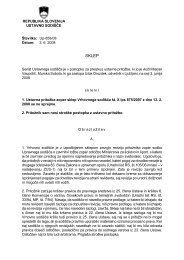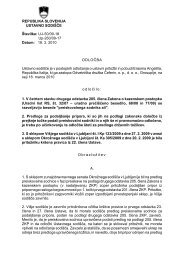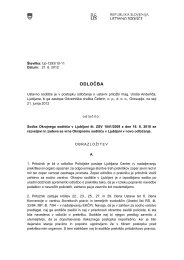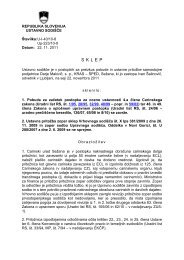REPUBLIKA SLOVENIJA USTAVNO SODIŠČE
REPUBLIKA SLOVENIJA USTAVNO SODIŠČE
REPUBLIKA SLOVENIJA USTAVNO SODIŠČE
Create successful ePaper yourself
Turn your PDF publications into a flip-book with our unique Google optimized e-Paper software.
<strong>REPUBLIKA</strong> <strong>SLOVENIJA</strong><strong>USTAVNO</strong> <strong>SODIŠČE</strong>Up-106/9610.7.1997DECISIONAt a session held on 10 July 1997, in a proceeding of deciding the constitutional appeal of A.G. fromB., represented by H.J., attorney in L., the Constitutional Courtreached the following decision:1. The judgement of the Supreme Court no. IV Ips 5/96 of 27.3.1996, decision of the RepublicanSenate for violations no. Pp 5361/94 of 17.10.1995 and decision of the Municipal Judge for violationsin Šmarje pri Jelšah no. P/K-18/94 of 14.10.1994 are annulled.2. The case is returned to the Judge for violations in Šmarje pri Jelšah for a fresh decision.ReasoningA.1. By the impugned decisions, the appellant was found liable for a violation under point 6 of the firstparagraph of article 68 of the Sales Tax Act (Official Gazette RS, no. 4/92 and 71/93 - hereinafter:ZPD). On 5 August 1993, he is said to have used by negligence extra-light heating oil as fuel for atransport vehicle. He asserts violation of the provisions of article 2, article 15 (exercising and restrictingrights), article 22 (equal protection of rights), article 33 (right to private property and inheritance) andarticle 67 of the Constitution (ownership).2. The appellant believes that the asserted violation cannot be committed from negligence. Theintention of the law is supposed to be the protection of tax interests. Avoiding tax obligations is claimedto be possible only with intent (with malice aforethought in order to avoid payment of tax). The form ofguilt of negligence should already be excluded by the statutory provision which determines theoffence. The provision is said to require even gross intent. The word "intent" can only be interpreted inconnection with the mental attitude of the perpetrator to the act. The Supreme Court is claimed not tohave answered these statements of the appellant. Violation is thus claimed of his right to judicialreview (article 23 of the Constitution). The impugned decisions are claimed not to have cited thestatutory or regulatory act from which could derive the (claimed) duty of the appellant to prevent hisextra-marital partner from putting such fuel in the fuel tank. Violation is thus claimed of articles 22 and2 of the Constitution. There is claimed not to be in the decisions an assessment of the appellant'sclaims that he did not know that he had fuel oil in the tank, and that it was in fact a mistake. Objectiveresponsibility is claimed to be introduced in the decisions. The judgement proper is said to be deficientsince it does not contain the form of guilt of committing the offence.3. ZPD is claimed not to have determined that the punitive measure of dispossession of a motorvehicle is mandatory; the measure is claimed to represent a disproportionate sanction, which isclaimed to have meant the practical existential destruction of the appellant and his family; the organswho decided in the procedure did not consider whether the disproportionality of the measure could bethe subject of their judgement. The organs who tried the offence are claimed not to have establishedthe circumstances in relation to ownership of the transport vehicle; the vehicle is claimed, namely, notto be the property of the appellant, but of a third person.4. Simultaneous to the constitutional appeal, the appellant proposed also a judgement of theconstitutionality of the provisions of ZPD on the basis of which he was held liable for the offence, thatis to say, point 6 of the first paragraph and the third paragraph of article 68 ZPD. By resolution no. U-I-183/96 of .... the Constitutional Court rejected the initiative for assessing the constitutionality of point 6
310. According to the above stated, the asserted violations of articles 2, 15, 22, 23 and 28 of theConstitution are not shown in the case being heard.11. The appellant's reproach concerning establishing the circumstances in relation to the ownership ofthe dispossessed transport vehicle is well founded. The appellant stated this claim in appeal againstthe decision of first instance; according to his statements in the appeal and in the constitutionalappeal, he drew attention to the fact that he is not the owner of the confiscated cargo vehicle in theproceeding before the organ of first instance. The organ of second instance, which decided on theappeal, rejected the appellant's reproach, on the grounds that confiscation of the cargo vehicle ismandatory under the third paragraph of article 68. It referred in this to the same standpoint of theSupreme Court, taken in the same case.12. The appellant also has legal interest that the organ of jurisdiction in a procedure on a violationestablish who is the owner of assets which are to be confiscated. An owner of confiscated objects whois not at the same time the perpetrator of an offence, is, namely, entitled to compensation (secondparagraph of article 37 ZP). It was unnecessary for the Constitutional Court to go into a judgement ofwhether it was permissible in the case under consideration to confiscate the cargo vehicle of a thirdperson and - if the answer to the first question is negative - whether the applicant, in drawing to theattention of the organ of jurisdiction that the owner of the confiscated vehicle is a third person, dideverything necessary to be relieved of liability for damages.13. A decision on the confiscation of assets is an encroachment on constitutionally guaranteedownership (article 33 of the Constitution). Encroachment is thus permissible only under conditionsdetermined by the Constitution. The Constitution allows confiscation of property in order to protect therights of others (third paragraph of article 15) and under conditions determined in article 67(ownership) and 69 (dispossession). In both the last two cases confiscation of property can only bebased on an explicit statutory provision. There is not such a statutory basis in ZPD for the confiscationof a cargo vehicle of a person found liable for an offence. ZPD does not determine that the motorvehicle be confiscated irrespective of whether the owner is liable for the offence. The only statutoryprovision which could provide a statutory basis in the case under consideration for the confiscation ofa cargo vehicle of a third person and not the perpetrator is thus the provision of the second paragraphof article 37 ZP. Under this provision, assets may be confiscated from a third person who is not theperpetrator of an offence only if this is required for general safety, protection of life and health ofpeople, security of trade or reasons of public morality. The organ of jurisdiction must thus judgewhether the conditions are provided for the confiscation of a cargo vehicle of a third person who is notthe perpetrator of an offence and - if there are not these conditions - who is the owner of the cargovehicle which is supposed to be confiscated. Because of a mistaken interpretation of the law, theappellant's right to private property under article 33 of the Constitution was violated.14. On the basis of the above mentioned, the Constitutional Court annulled the impugned decisionsand returned the case for a fresh decision by the organ of first instance (first paragraph of article 59 ofthe Constitutional Court Act, Official Gazette RS, no. 15/94 - hereinafter: ZUstS). In the freshproceeding, the organ of jurisdiction will have to decide whether reasons are given for the confiscationof a cargo vehicle of a person who is not the perpetrator of an offence (second paragraph of article 37ZP), and in view of the answer to that question, perhaps further, who is the owner of the cargo vehiclewhich is to be confiscated.15. In deciding on the appellant's appeal, the Constitutional Court temporarily restrainedimplementation of the third paragraph of article 68 ZPD. The decision means that until a decision onthe appeal, it will not be possible to order measures under the third paragraph of article 68 ZPD andthat it is necessary to return the seized vehicle to the appellant.C.The Constitutional Court adopted this decision on the basis of the first paragraph of article 59 ofZUstS, composed of: president Dr. Lovro Šturm and judges Dr. Peter Jambrek, Dr. Tone Jerovšek,Mag. Matevž Krivic, Mag. Janez Snoj, Dr. Janez Šinkovec, Franc Testen, and Dr. Boštjan M.Zupančič. The resolution was adopted by seven votes against one. Judge Snoj voted against.
4P r e s i d e n tDr. Lovro Šturm
















